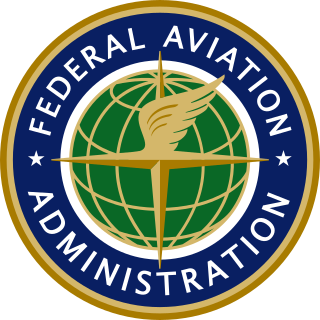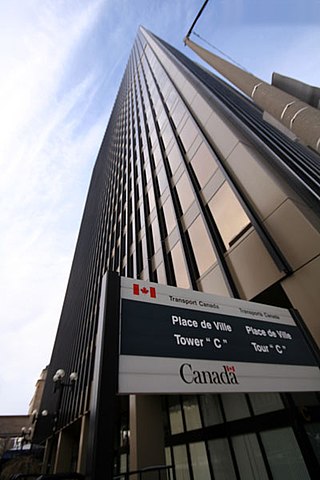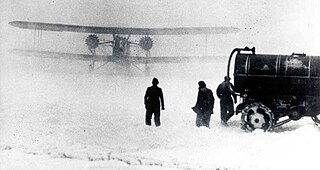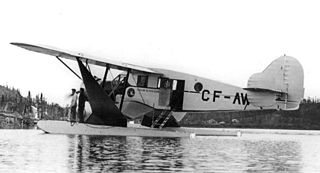Related Research Articles

Aircraft hijacking is the unlawful seizure of an aircraft by an individual or a group. Dating from the earliest of hijackings, most cases involve the pilot being forced to fly according to the hijacker's demands. There have also been incidents where the hijackers have overpowered the flight crew, made unauthorized entry into the cockpit and flown them into buildings—most notably in the September 11 attacks—and in some cases, planes have been hijacked by the official pilot or co-pilot, such as with Ethiopian Airlines Flight 702.

The Federal Aviation Administration (FAA) is a U.S. federal government agency within the U.S. Department of Transportation which regulates civil aviation in the United States and surrounding international waters. Its powers include air traffic control, certification of personnel and aircraft, setting standards for airports, and protection of U.S. assets during the launch or re-entry of commercial space vehicles. Powers over neighboring international waters were delegated to the FAA by authority of the International Civil Aviation Organization.
Air Canada is the flag carrier and the largest airline of Canada, by size and passengers carried. Air Canada is headquartered in the borough of Saint-Laurent, Montreal, Quebec. The airline, founded in 1937, provides scheduled and charter air transport for passengers and cargo to 222 destinations worldwide. It is a founding member of the Star Alliance. Air Canada's major hubs are at Toronto Pearson International Airport (YYZ), Montréal–Trudeau International Airport (YUL), and Vancouver International Airport (YVR).

Barnstorming was a form of entertainment in which stunt pilots performed tricks individually or in groups that were called flying circuses. Devised to "impress people with the skill of pilots and the sturdiness of planes," it became popular in the United States during the Roaring Twenties.
A sky marshal is a covert law enforcement or counter-terrorist agent on board a commercial aircraft to counter aircraft hijackings. Such an agent is also known as an air marshal, a flight marshal, or an in-flight security officer (IFSO). Sky marshals may be provided by airlines such as El Al, or by government agencies such as the Austrian Einsatzkommando Cobra, Royal Canadian Mounted Police, German Federal Police, National Security Guard in India, Metropolitan Police MO19 from London, Pakistan Airports Security Force, or US Federal Air Marshal Service.
The Air Commerce Act of 1926 created an Aeronautic Branch of the United States Department of Commerce. Its functions included testing and licensing of pilots, certification of aircraft and investigation of accidents.

Varney Air Lines was an American airline company that started service on April 6, 1926, as an airmail carrier. Formed by Walter Varney, the airline was based in Boise, Idaho, United States. The airline is one of the predecessors of United Airlines.

The Federal Air Marshal Service (FAMS) is a United States federal law enforcement agency under the supervision of the Transportation Security Administration (TSA) of the United States Department of Homeland Security (DHS).

Transport Canada is the department within the Government of Canada responsible for developing regulations, policies and services of road, rail, marine and air transportation in Canada. It is part of the Transportation, Infrastructure and Communities (TIC) portfolio. The current Minister of Transport is Anita Anand. Transport Canada is headquartered in Ottawa, Ontario.

The Air Mail scandal, also known as the Air Mail fiasco, is the name that the American press gave to the political scandal resulting from a 1934 congressional investigation into the awarding of contracts to certain airlines to carry airmail and the subsequent disastrous use of the U.S. Army Air Corps (USAAC) to fly the mail after the contracts were revoked.

Kenneth Harry Dahlberg was an American businessman and highly decorated World War II fighter ace. According to reporter Bob Woodward, a check made out to Dahlberg was a key part in connecting the Watergate scandal to President Richard Nixon's re-election campaign, though Dahlberg himself was not accused of any wrongdoing.

Washington-Hoover Airport was an airport serving the city of Washington, D.C., in the United States from 1933 to 1941. It was created by the merger of Hoover Field and Washington Airport on August 2, 1933. It was in Arlington, Virginia, near the intersection of the Highway Bridge and the Mount Vernon Memorial Highway. Washington-Hoover Airport, like its predecessors, suffered from safety problems, short runways, and little room to grow. It closed for public use in June 1941, and the United States Department of War purchased the site in September, closing it for good. Washington National Airport, which opened in June 1941, was built as its replacement. The Pentagon now occupies the site.
The Plan for the Security Control of Air Traffic and Air Navigation Aids (SCATANA) is an emergency preparedness plan of the United States which prescribes the joint action to be taken by appropriate elements of the Department of Defense, Federal Aviation Administration, and the Federal Communications Commission in the interest of national security in order to effectively control air traffic and air navigation aids under emergency conditions. Known versions of the plan are dated June 1971 and August 1975. The plan implements parts of the Federal Aviation Act of 1958, the Communications Act of 1934, and Executive Order 11490 of October 28, 1969.

The Federal Aviation Act of 1958 was an act of the United States Congress, signed by President Dwight D. Eisenhower, that created the Federal Aviation Agency and abolished its predecessor, the Civil Aeronautics Administration (CAA). The act empowered the FAA to oversee and regulate safety in the airline industry and the use of American airspace by both military aircraft and civilian aircraft.

George Jackson Mead was an American aircraft engineer. He is best known as one of the chief founding team members, together with Frederick Rentschler, of Pratt & Whitney Aircraft. Mead and Rentschler left Wright Aeronautical with the plan to start their own aviation-related business; they founded Pratt & Whitney Aircraft in July 1925. Their first project was to build a new, large, air-cooled, radial aircraft engine of Mead's design, which soon came to be named the Wasp. The first Wasp model was the R-1340, and a large series of Wasp models and Hornet models followed. Mead, as Vice President of Engineering, was the head of engineering for Pratt & Whitney from 1925 to 1935. He later left Pratt & Whitney and its parent United Aircraft. He served as the president of the U.S. National Advisory Committee for Aeronautics (NACA), and he served as head of the aeronautical section of the National Defense Advisory Commission during World War II, as a manager in the U.S. government's war materiel production effort.

The Douglas DC-2 is a 14-passenger, twin-engined airliner that was produced by the American company Douglas Aircraft Company starting in 1934. It competed with the Boeing 247. In 1935, Douglas produced a larger version called the DC-3, which became one of the most successful aircraft in history.

The Eldorado Radium Silver Express was the name of a semi-regular air service between Edmonton, Alberta and Port Radium, Northwest Territories, or between Port Radium and a refinery at Port Hope, Ontario. A single airplane, a Bellanca Aircruiser, a small bush plane, provided this service, from 1935 to 1947.
Boston Metropolitan Airport was an airfield in Canton, Massachusetts, on the northeast side of Neponset Street just southeast of the Neponset River.

Emily Joyce Howell Warner was an American airline pilot and the first woman captain of a scheduled U.S. airline.
Transportation in the United States is governed by laws and regulations of the federal government. The Department of Transportation is responsible for carrying out federal transportation policy, and the Department of Homeland Security is responsible for security in transportation.
References
- ↑ "Aviation Commission To Meet In Oakland". Berkeley Daily Gazette . July 30, 1934. Retrieved 2011-06-01.
- ↑ Investigation of government patent practices and policies. United States Government Printing Office. 1947.
- ↑ "Asks 4,000 Planes For Military Use. Federal Aviation Commission Report to Be Sent to Congress Next Week. Control Board Sought. Howell Group Proposes Temporary Body to Act Until Expanded ICC Can Function". The New York Times . January 24, 1935. Retrieved 2011-06-01.